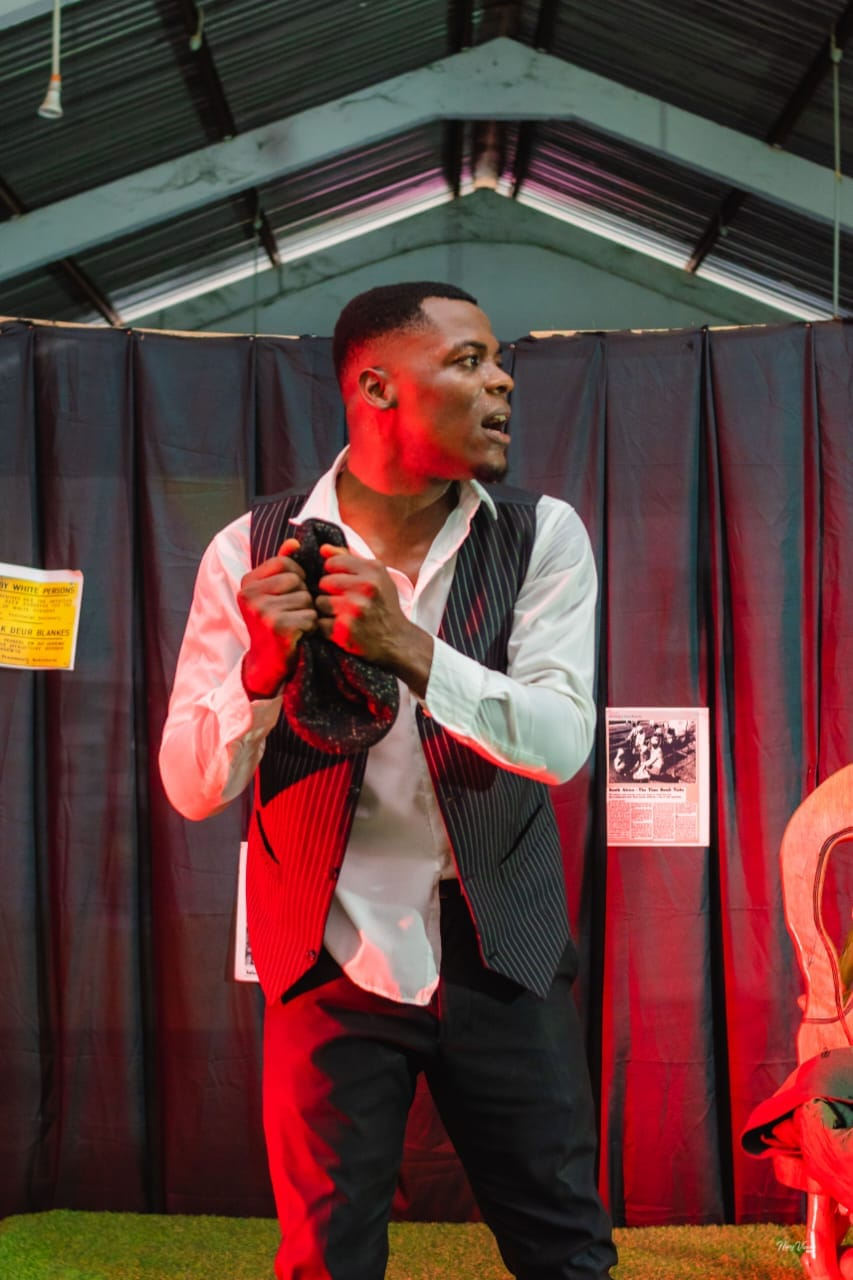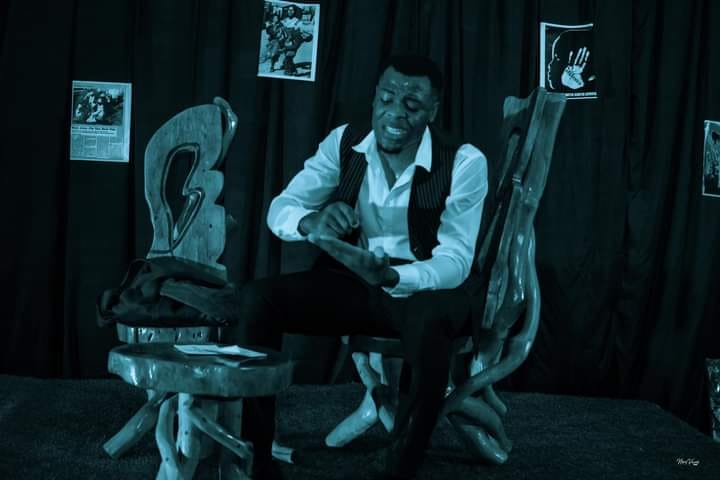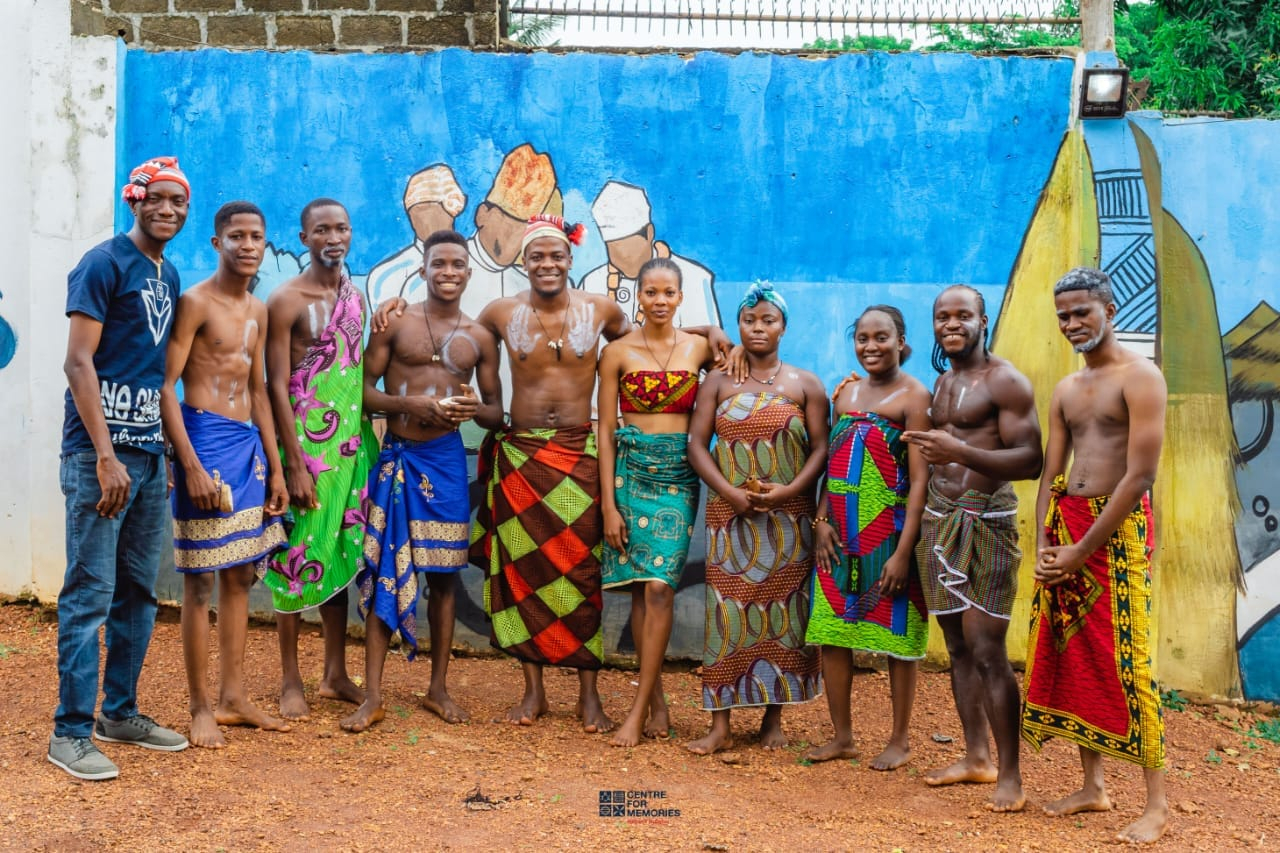In this interview, Ikenna Okeh speaks with Nigerian stage performer, Ude Ibiam Ufiem, manager of the theatre group 'Ijele Renaissance Theatre'.
Tell us about your work in theatre in Africa.
My name is Ude Ibiam Ufiem. I am the theatre manager of Ijele Renaissance Theatre. My work in theatre in Africa is that of renaissance of indigenous cultural beliefs, language preservation and ethnic value systems. I see my work to be a way of cultural revival through stage plays.

What events or series of events inspired your decision to go into theatre?
My journey onto the stage first began in secondary school when I formed a comedy group consisting of about six of my classmates. We entertained the school every Wednesday during our moral instruction gatherings. Those were my best moments in school, because we used it to tackle issues that affected the student and staff and body. It was relieving then to see that our plays had impact in the school, especially as it served as a means of driving home some of the things the school principal tried to address during morning assembly.
This motivated me to look towards drama as a very vital tool to championing social causes. Then, coming to what motivated me to go into theatre, I will say here that two things actually motivated me to go into theatre. One, the passion for stage plays. Secondly, I enjoy the immediate connection that plays always have on its audience. That feeling is magical.
Tell us about Ijele Renaissance Theatre and the work you do.
Ijele Renaissance Theatre is a cultural theatre in Enugu, Eastern Nigeria.
The uniqueness of theatre is in its ability to address issues that have direct bearing on the society. My work with the team is to create a medium through which profound and vital communal experiences are projected and appreciated. I have a team of committed forty young thespians (age range 18-30) who are committed to the goal, and are ready to change the world with their art in acts. Our common goal has always been to provide entertainment to the society even as we tend to revive some communal values and belief system, thereby changing the narrative of how art should be perceived.
We just celebrated our one-year anniversary two weeks ago, and I just want to thank the Almighty God for the success of the journey so far. In the space of one year, we have registered with the Corporate Affairs Commission together with the Ministry of Culture and Tourism, Enugu State chapter. We have hosted three plays; Pieces of our Bones (a theatrical adaptation of the Nigerian-Biafran Civil War) Ụwa Mụnachi ( An old Soul: the Myth of Ọgbanje in Igbo land) Sizwe Bansi Is Dead (A solo theatrical adapation).
We have also performed at some events that we were invited to. We have also collaborated with some companies and associations like, ASHOKA, Ajambele, Enugu Literary Society, Dreams on Screen, Centre for Memories, Radio Nigeria Coal City FM, Afia Tv, American Space Nigeria, Adanta Cultural Troupe of Nigeria, iTourAfrica, Owelle Fm, Chaizy Honey, Jigbo042, Grandpasteries, Ihuaku Igbo School, Hillrange Secondary School, Kosher Wheels Gospel, among many others. All I can say for now is that the world should watch out for us, because this team is ready for whatever it will take to share this gospel of arts in theatre to the world at large.

In the 70’s and early 80’s, theatre in Nigeria and most of Africa was getting prominence. Wole Soyinka and a good number of artists of his class made their mark in that time. But in the 90’s there was a decline in theatre. What do you think was responsible for that moment of decline?
First, I would say that this dearth in theatre came in as a result of the government looking down on the art of theatre, and this is borne out of the parochial belief that arts have little or nothing to offer in addressing societal problems. We don’t have theatre venues anymore. In fact the few ones we have across the nation are in deplorable states of disrepair. Hence theatre makers are left hanging with the challenge of where to always host their plays. Take Enugu State as an instance; there are so many abandoned buildings in Enugu town, even the former Arts Theatre has been lying waste for more than a decade now and no government has shown any concern for the place.
I know how much we spend in renting halls just to host our plays as a team. If not for our doggedness and determination as a team, we would also have fallen away like broken seeds by the wayside. I think this is a great discouraging factor to the promotion of arts in theatre.
Secondly, on the issue of the cause for this decline, I will say that there is an absence of passion and a lack of incentive to host stage plays these days. Everybody wants to be on screen or shoot a film for the cinema. I have done a survey across the personality of theatre makers in Nigeria, especially in the East, and most of them are not graduates of Theatre Arts departments. Many stumbled on this profession by passion or by chance, and they are doing well in it. On the other hand, graduates of the Theatre Arts departments are running away from stage plays and finding a space in the movie industry.
I have seen so many Theatre Arts graduates who are no more interested in going back to the stage.
Lastly, we don’t have playwrights anymore. Or better still, we have only few of them still hanging around. The community now is filled with scriptwriters and docu-writers. I think we need more playwrights in our space if we are actually going to salvage this decline.
In Lagos and in the East of Nigeria, there is an ongoing awareness on theatre. Although subtle, still it can be noticed if one pays close attention. Do you think it is safe to interpret this as a sort of renaissance with theater in Nigeria? Will this gain momentum? What is the underlying factor behind this build up of interest in theatre?
Well I think that this will gain momentum, because the kind of guys I’m seeing on this path now, they mean business. They are not here for the money or the fun of it, they are here for a great assignment, and as you called it, it’s an assignment of revival.
I think the underlying factor behind this build up of interest in theatre is that these theatre makers have come to realize that theatre plays a vital role in building a national cultural consciousness in the society. Apart from this, theatre too is entertaining, and we should not throw such to the dust all because we were handed a camera during sport.
Recently, you organized a solo stage adaptation of the South African play, ‘Sizwe Bansi is Dead’ at the Centre of Memories, Enugu. What inspired your choice of material and style?
Yea! Sizwe Bansi is Dead is a story that resonates and cuts across the struggles of any young man in Africa. I first read it in my fourth year of secondary school, and since then I have come to realize the futility of a man without the right documents to fight for his own right in a world like today. Due to his passbook number and his face, he (Sizwe) wasn’t allowed to work and stay in Port Elizabeth, even though he wanted to just work and have money to feed his family. But immediately Buntu, his friend, changed his face with that of the dead man’s, Robert Zwelinzima, we saw a spark of hope and light on his dark paths. Even in the midst of this hope, he has to be careful, because his skin is trouble. This story is somewhat personal to me because I see myself in every line and in every page of this book.
Must I change my country in order to amount to something in life? Must I change my native names in order to be given a job in Abuja or Lagos or any other state in Nigeria ? What is my fate as a young man if I should settle down in this country and raise my kids here? What will be their fate too? These words of Buntu to Sizwe summarizes it all for me when he said “ Ghost? Wasn’t Sizwe Bansi a ghost? Oh! Wasn’t he? When the white man at the labour bureau looked at your face what did he see? A man with respect and dignity or another passbook with an N.I number, isn’t that a ghost? ...When you Sizwe walked down the main street and the little white child shouts at you, “Hey! Boy!” You a man circumcised , a wife and four children, isn’t that ghost? All I want you to be is a real ghost man, that is all that they have turned us into ...”.
the underlying factor behind this build up of interest in theatre is that ... theatre plays a vital role in building cultural consciousness in any society.
I believe that I am at the prime stage of my journey here on earth, and in my dreams too at times the fears of Sizwe come upon me. This play is actually an escape route to my fears , because that is one of the beautiful works of the theatre; that moment it removes you from being an audience or an artist, and makes you the story itself.
In your opinion, what are the fundamental challenges to the growth of theatre in your locality?
First as I mentioned earlier, not having a theatre venue being provided by the government to stage these plays is a major set-back to the growth of theatre here.
Secondly, having little or no support coming from the Ministry of Arts and Culture, just because they also lack proper funding from the state government. I think that the state government should also try reviving and developing interest in arts again and not just channeling all the resources towards sports.
What role do you think Theatre Arts departments in Nigerian universities should play in the sustenance of theatre?
Yea, I believe that Theatre Arts departments in Nigerian universities play a major role in the sustenance of theatre. I believe that they should not just teach their students how to act, dance or write scripts, but they should find a way to inspire their students and motivate them on the need to carry out whatever they might have learnt from the department and find a way to adapt it in their communities by owning their own theatre groups, hosting theatre shows and a lot more. I think this motivation is the major key to this sustenance. As I said earlier, I have seen so many theatre arts graduates who are no more interested in going back to stage. In fact they see it as a work of stress. With the right orientation, this should not be so.
Do you have any project in the works?
Yes, currently we are working on Ola Rotimi’s “Our Husband Has Gone Mad Again”.
